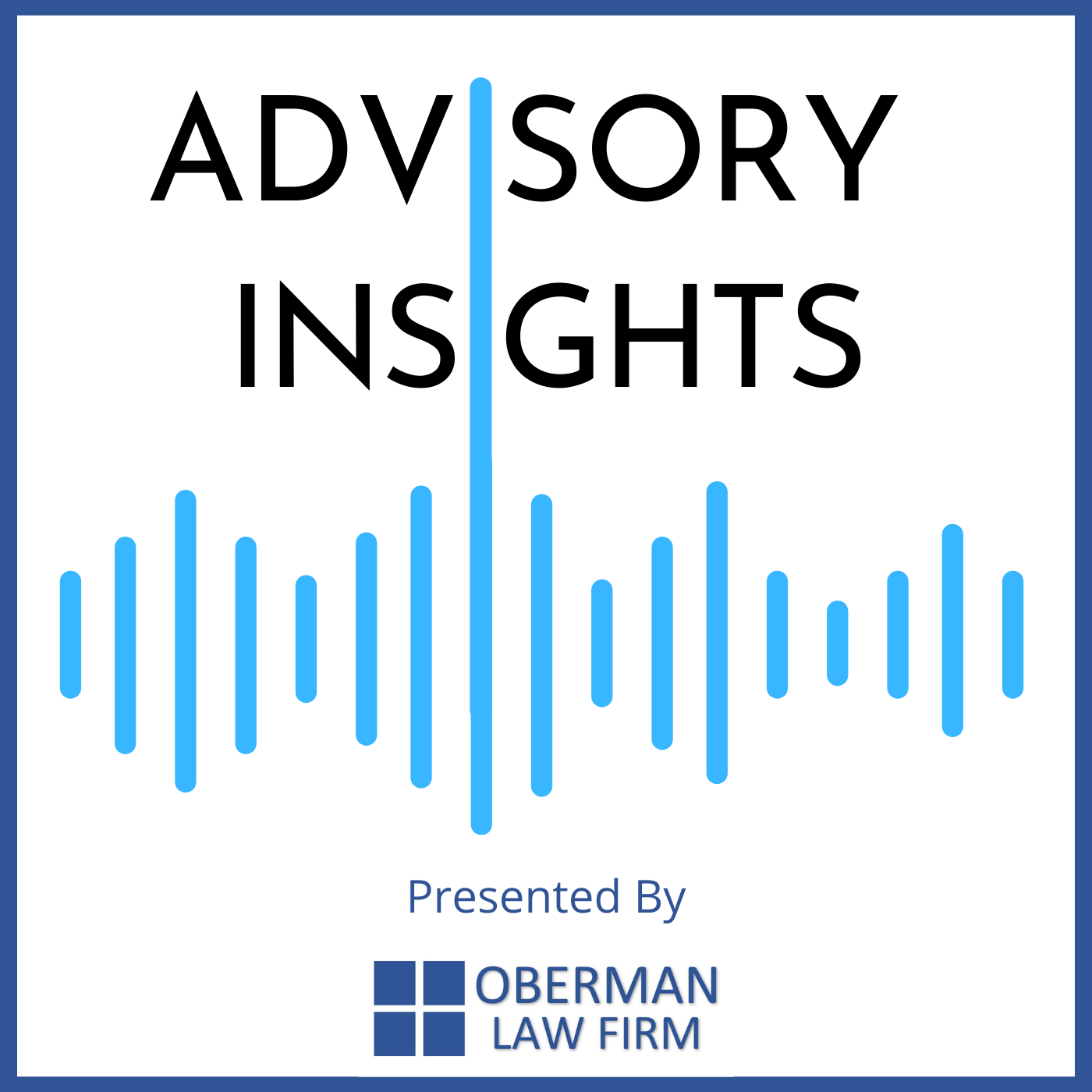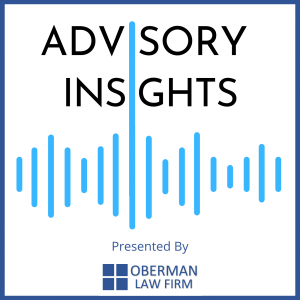
Introduction to the Advisory Insights Podcast
In this introductory episode of the Advisory Insights Podcast, Stuart Oberman welcomed listeners to this new podcast featuring legal, business, HR, and other topics of vital concern to healthcare practices and other business owners. (Advisory Insights is the successor show to Dental Law Radio.) He went on to cover an extensive list of essential topics to be included in employee manuals and guidelines and more.
TRANSCRIPT
Intro: [00:00:01] Broadcasting from the studios of Business RadioX, it’s time for Advisory Insights. Brought to you by Oberman Law Firm, serving clients nationwide with tailored service and exceptional results. Now, here’s your host.
Stuart Oberman : [00:00:19] Hello everyone, and welcome to Advisory Insights Podcast. Well, first, I’d like to welcome our dental clients who followed us over to dentallawradio.com, and also our new listeners. I could not be more excited about what we’re doing with Advisory Insights Podcast.
Stuart Oberman : [00:00:36] We had a platform previously, and we discovered that we are getting national exposure on our platforms, what we said before. So, we took a little bit of a break and we decided, You know what? We’re going to take what you can use, no matter whether you are a health care practice or global company. We’re going to keep things simple. We’re going to keep it basic. And what our clients need to know on a day-to-day basis on how to stay, hopefully, out of trouble.
Stuart Oberman : [00:01:04] And we’d like to thank North Fulton Business Radio and Business RadioX for hosting us. But we’re going to start gearing this thing up pretty hard.
Stuart Oberman : [00:01:13] So, what are we going to talk about today? Well, let me just tell you this. In this great world that we live in of the Great Resignation, H.R. is a headache, there’s no doubt about it. So, I’ve been talking for a while on employee manuals and guidelines. I want to start off on a couple of things that, again, no matter what size you are, you need to take a look at this.
Stuart Oberman : [00:01:31] First and foremost, I don’t care if you have $1,000,000 a year on revenue or $50 billion, you need to look at your H.R. annually. You have to take a look at what the company culture is, what the headcount is, what are your benefits, are your renewals up. And in today’s world, I’ve been stressing for a long, long time, look, employee manuals will either make you or break you, and are just no longer an option.
Stuart Oberman : [00:01:56] And we had a really, really great podcast with SHRM Atlanta. For those of you that don’t know what SHRM Atlanta is, it’s an unbelievable organization. And we get a lot of information from those guys on a regular basis. And it’s employee manuals. It’s H.R. It’s a lot of internal information.
Stuart Oberman : [00:02:21] But I want to tell you something, what is no longer an option, you’ve got to know State and Federal law. You’ve got to know about EEOC. You’ve got to know about National Labor Relations Board. You have to know the Age Discrimination and Employment Act of 1967. You’ve got to know Title VII of the Civil Rights Act 1964. You have to know the Equal Pay Act of 1963. You got to know the Worker’s Adjustment and Retraining Notification Act. You’ve got to know Sections 1981 and 1983 of the Civil Rights Act. You’ve got to know the American Disabilities Act. You’ve got to know the Family for Medical Leave Act. You’ve got to know the Employees Retirement Income Security Act. You have to know the Old Benefits Protection Act. You have to know the Age Discrimination Act of 1967.
Stuart Oberman : [00:03:04] How in the world are you going to run a business if you don’t know what those things are? Those have got to be in your manual. There’s no longer an option. If you don’t know any of those, if you don’t know a lot of those, or you don’t know really all of those, you need to figure out what you’re doing. You need to look internally at what you’re doing.
Stuart Oberman : [00:03:20] And failure to plan, I can’t tell you how many clients we have that are global, local, regional, and national that have no idea what I’m talking about. And that’s extremely dangerous. Not only is it costly, it’s a nightmare. So, a couple of provisions are really no longer an option. Really, again, drilling it down, What do you need? What do you need?
Stuart Oberman : [00:03:45] You know, first and foremost, in your employee manuals, you’ve got to have the at-will statements, you have the disclaimers, you’ve got to have the EEOC statement, you’ve got to have the anti-harassment issues. You’ve got to have the wage and salary, leave of absence, drug testing, social media policies. You’ve got to have the non-solicitation employment acknowledgment manual. How many employers out there have given their employee manuals to people, documents, and have no signatures acknowledging if it’s not in writing, it never happened. I’ll just telling you that right now.
Stuart Oberman : [00:04:15] You know, do you have your Family and Medical Leave Act policies? Do you have a non-gender discrimination salary ranges? When is the last time you’ve thoroughly evaluated your salaries ranges gender neutral. If they are not gender neutral, you are in a world of hurt. Are we looking at nondiscrimination in dress codes now? Are we looking at tattoo issues? Are we looking at age inquiries of prospective employees? Age inquiries, that’s a no, no. We’re going to cover that in probably our future podcasts. Holiday pay, voting time, Education Assistance Program.
Stuart Oberman : [00:04:58] Look, I know I ran through this so, so fast. I could probably spend 40 minutes on each topic that I ran through on the employee manual requirements, on employee guideline requirements. Here’s the key, again, what we’ve done on a local level, regional, national level, global level, again, whether you are a small health care provider or whether you’re a building company, these are the basics you’ve got to know. We have clients that have no H.R. client, but they’re doing a half-a-billion dollars a year. I don’t really understand that.
Stuart Oberman : [00:05:33] So, look, if you just took one thing away, it is you’ve got to know these things. If you have any questions, let us know. Hopefully, by listening to the podcast, again, we ran through a lot of information. I could talk, you know, an hour on each topic that we talked about. The key is evaluate, evaluate, evaluate.
Stuart Oberman : [00:05:50] And these are the kind of things we want to bring to you on a very, very scaled down basis on advisorypodcast.com. And we’re going to continue to do this and we’re going to continue to broadcast to our constituents, to our clients, to our friends in the industry, whether it’s health care, whether it’s general business that these are things you have to know.
Stuart Oberman : [00:06:11] Well, that is going to be our first episode of advisoryinsightspodcast.com Thank you everyone for joining us. If you have any questions, please feel free to reach out to us at 770-886-2400 or visit us at obermanlaw.com, or, in this great world that we live in, email. Please feel free to email at stuart, S-T-U-A-R-T, @obermanlaw.com.
Stuart Oberman : [00:06:37] Thank you, everyone, and we appreciate your attendance in today’s podcast. And we look forward to jumping on some more hot topics. Have a great day, everyone. Thank you.
Outro: [00:06:49] Thank you for joining us on Advisory Insights. This show is brought to you by Oberman Law Firm, a business-centric law firm representing local, regional, and national clients in a wide range of practice areas, including health care, mergers and acquisitions, corporate transactions, and regulatory compliance.
About Advisory Insights
Advisory Insights is presented by Oberman Law Firm and produced by the North Fulton studio of Business RadioX®. The series can be found on all the major podcast apps. You can find the complete show archive here.
Stuart Oberman, Oberman Law Firm

Stuart Oberman is the founder and President of Oberman Law Firm. Mr. Oberman graduated from Urbana University and received his law degree from John Marshall Law School. Mr. Oberman has been practicing law for over 25 years, and before going into private practice, Mr. Oberman was in-house counsel for a Fortune 500 Company. Mr. Oberman is widely regarded as the go-to attorney in the area of Dental Law, which includes DSO formation, corporate business structures, mergers and acquisitions, regulatory compliance, advertising regulations, HIPAA, Compliance, and employment law regulations that affect dental practices.
In addition, Mr. Oberman’s expertise in the healthcare industry includes advising clients in the complex regulatory landscape as it relates to telehealth and telemedicine, including compliance of corporate structures, third-party reimbursement, contract negotiations, technology, health care fraud, and abuse law (Anti-Kickback Statute and the State Law), professional liability risk management, federal and state regulations.
As the long-term care industry evolves, Mr. Oberman has the knowledge and experience to guide clients in the long-term care sector with respect to corporate and regulatory matters, assisted living facilities, continuing care retirement communities (CCRCs). In addition, Mr. Oberman’s practice also focuses on health care facility acquisitions and other changes of ownership, as well as related licensure and Medicare/Medicaid certification matters, CCRC registrations, long-term care/skilled nursing facility management, operating agreements, assisted living licensure matters, and health care joint ventures.
In addition to his expertise in the health care industry, Mr. Oberman has a nationwide practice that focuses on all facets of contractual disputes, including corporate governance, fiduciary duty, trade secrets, unfair competition, covenants not to compete, trademark and copyright infringement, fraud, and deceptive trade practices, and other business-related matters. Mr. Oberman also represents clients throughout the United States in a wide range of practice areas, including mergers & acquisitions, partnership agreements, commercial real estate, entity formation, employment law, commercial leasing, intellectual property, and HIPAA/OSHA compliance.
Mr. Oberman is a national lecturer and has published articles in the U.S. and Canada.
Oberman Law Firm
Oberman Law Firm has a long history of civic service, noted national, regional, and local clients, and stands among the Southeast’s eminent and fast-growing full-service law firms. Oberman Law Firm’s areas of practice include Business Planning, Commercial & Technology Transactions, Corporate, Employment & Labor, Estate Planning, Health Care, Intellectual Property, Litigation, Privacy & Data Security, and Real Estate.
By meeting their client’s goals and becoming a trusted partner and advocate for our clients, their attorneys are recognized as legal go-getters who provide value-added service. Their attorneys understand that in a rapidly changing legal market, clients have new expectations, constantly evolving choices, and operate in an environment of heightened reputational and commercial risk.
Oberman Law Firm’s strength is its ability to solve complex legal problems by collaborating across borders and practice areas.
Connect with Oberman Law Firm:
Company website | LinkedIn | Twitter
















